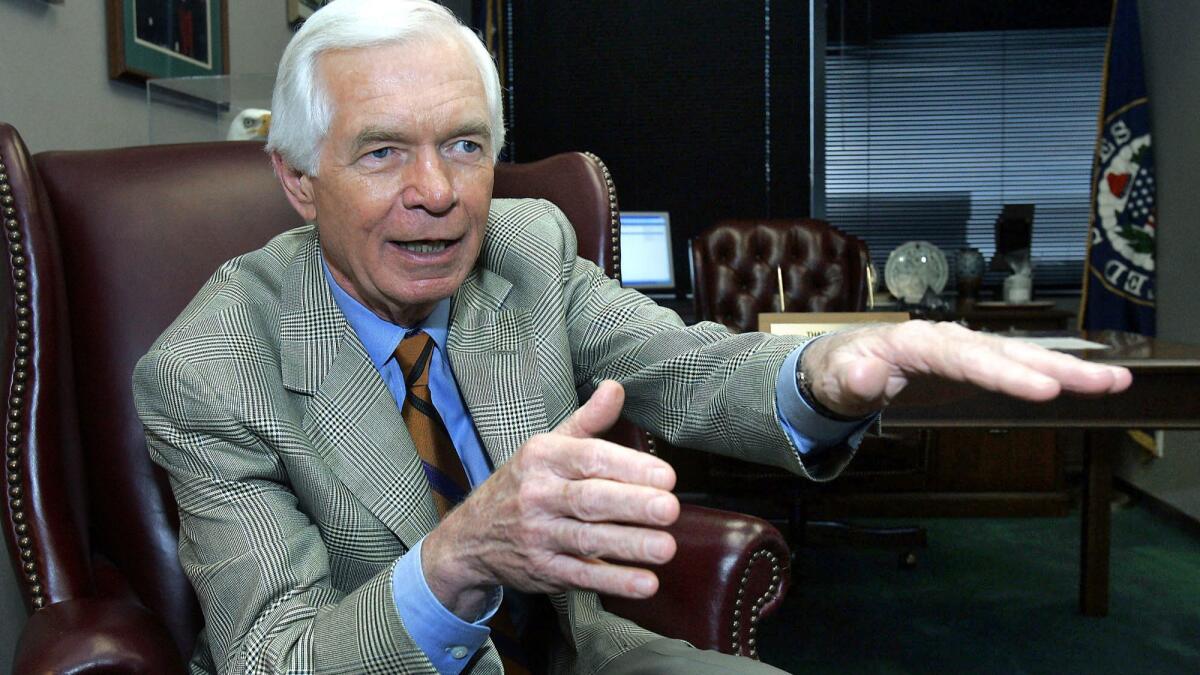Thad Cochran, lawmaker who showered Mississippi in money, dies at 81

- Share via
Former U.S. Sen. Thad Cochran, who served seven terms and used seniority to steer billions of dollars to his home state of Mississippi, has died. He was 81.
Cochran’s chief of staff, Brad White, said Cochran died Thursday at a veterans nursing home in Oxford.
Cochran was elected to the U.S. House in 1972. When he won a Senate seat in 1978, he became the first Republican since Reconstruction to win statewide office in Mississippi.
He led the Senate Appropriations Committee twice, from 2005 to 2006, and again from January 2015, when the GOP retook control of the Senate, until he retired last year because of his heath.
In his first stint, Cochran was a driving force in securing more than $100 billion in funding to help Gulf states recover from Hurricane Katrina in 2005. He was also a big practitioner of earmarks — home-state goodies such as highway projects, economic development grants and university research dollars.
GOP leaders banned earmarking, but Cochran was still pushing for defense contracts for his state when he returned to his committee leadership post in 2015. Ingalls Shipbuilding in Pascagoula, which makes a variety of Navy vessels, has long been one of Mississippi’s largest private employers.
Mild-mannered and known for working across party lines, Cochran won most of his reelection campaigns easily. However, he struggled in 2014 amid a Republican primary challenge from state Sen. Chris McDaniel, who was backed by tea party groups and had significant financial support from libertarian-leaning national groups that criticized Cochran as a big spender.
The campaign turned ugly as supporters of his opponent photographed Cochran’s bedridden wife, without permission, in the nursing home where she had lived a dozen years with dementia. Images of Rose Cochran were posted briefly online in a video that attempted to show that Cochran was having an inappropriate relationship with one of his longtime staff members, Kay Webber — an accusation that Cochran denied.
Weeks after four men were arrested and charged in the photo case, Cochran placed second, behind McDaniel, in a three-person Republican primary. During the three-week runoff campaign, Cochran actively sought support from a wide variety of voters, including African Americans who traditionally vote for Democrats.
Cochran defeated McDaniel in the runoff, but McDaniel never conceded and filed a lawsuit trying to overturn the results. A judge dismissed the lawsuit, saying McDaniel had waited too long to file it, and the state Supreme Court upheld that decision.
In the November 2014 general election, Cochran defeated Democratic former U.S. Rep. Travis Childers and the Reform Party’s Shawn O’Hara.
Rose Cochran died in December 2014, weeks before her husband was sworn in for his seventh six-year term in the Senate.
On May 23, 2015, Cochran married Webber in a small ceremony in Gulfport, Miss.
During his second stint as Appropriations Committee chairman starting in 2015, Cochran continued working to send money to Mississippi. He and the state’s other Republican senator, Roger Wicker, successfully pushed to get a national historic landmark designation for the home of Medgar Evers, the Mississippi NAACP leader who was assassinated in 1963 outside the house in Jackson. The ranch-style home operates as a museum. When it gained landmark designation in January 2017, it became eligible for grants and tax credits.
Cochran was born in the small town of Pontotoc, in the hill country of north Mississippi, and grew up in a suburb of Jackson. He earned a bachelor’s degree and law degree from the University of Mississippi, where he was a cheerleader as an undergraduate.
Cochran spent three years in the Navy and studied international law for a year at Trinity College in Dublin, Ireland, then moved to Jackson, where he was in a private law practice for seven years, before being elected to the House.
More to Read
Start your day right
Sign up for Essential California for the L.A. Times biggest news, features and recommendations in your inbox six days a week.
You may occasionally receive promotional content from the Los Angeles Times.






